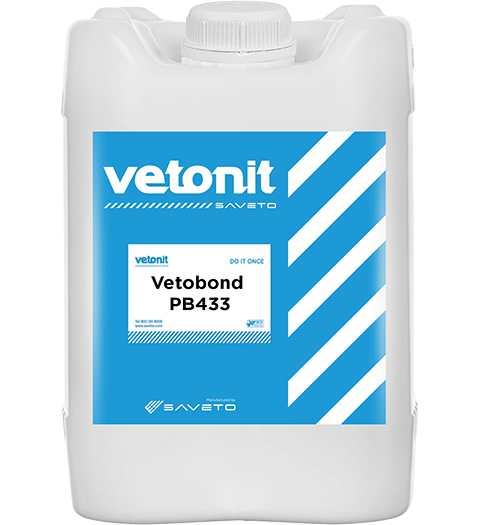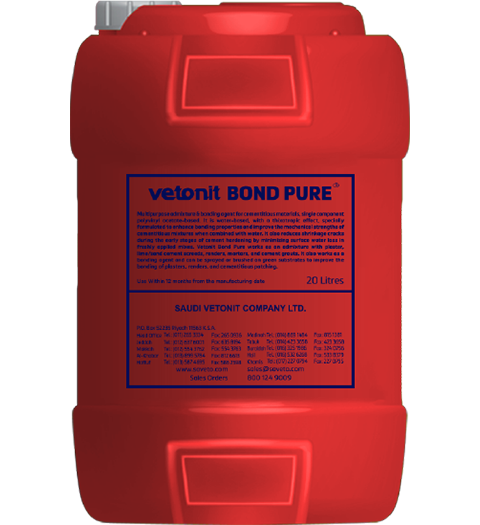Vetobond PB433
Resin adhesive, cement modifier, bonding agent, and sealer
Vetobond PB433 is a polyvinyl acetate (PVAc)-based bonding agent. The cement admixture, a non-toxic, non-flammable liquid of medium viscosity, dries to a transparent film sealer and cement modifier designed to be used as a low gauging liquid cementitious system. It can be used for internal applications as well.
Apply Vetobond PB433 directly from the bottle or pail using a brush, a roller, or spraying equipment onto the concrete substrate

Uses
- As a universal & versatile general adhesive.
- As a primer on bituminous material used for painting with oil-based paints.
- As a plaster bonding aid for tile and granolithic concrete toppings.
- As a dust proofer for cementitious surfaces.
- As an admixture to cement-based products.
Advantages
- Versatile (Can be used for various applications in many building trades).
- Environmentally friendly (water-based, odorless, and non-flammable).
- Suitable for use over bituminous materials.
- Easy to apply by brush, roller, or spray.
- Excellent bond to most construction materials.
- Cost-effective.
- Suitable for the weather conditions of the MENA region.
Usage Instructions
The surface must be sound and thoroughly cleaned before Vetobond PB433 is applied. All loose particles, old mortar, laitance, dirt, paint, etc., must be removed by brushing with a stiff /wire brush (or other suitable method).
Fungi or Algae should be scoured away using a hypochlorite-type bleach or a proprietary fungicidal solution. Then it must be washed with water.
Timber and composition boarding must be dry and free from wax, polish, and paint, etc. Remove all traces of oil and grease with an industrial-grade chemical degreaser or another suitable degreasing agent.
On vertical surfaces (where the paint cannot be removed), it is advisable to peck-hammer (except when planning to apply gypsum plasters). This ensures a bond between Vetobond PB433 and the structure and prevents failure due to lack of adhesion between the paint film and the substrate.
Porous surfaces should be sealed with a solution of 1 part Vetobond PB433 without dilution. If the surface is less absorbent, then dilution of up to 1 part PB433 to 10 part clean water.
Site trials are highly recommended before dilution. Breeze, foam, slag, and other lightweight building blocks are exceptionally absorbent and may require wetting down before sealing.
1. As a plaster bonding agent: For Gypsum, lightweight gypsum, and Anhydrous plasters, seal as you’re required and prime with a solution of 1 part Vetobond PB433 to 1 part water. Allow it to become tacky, then plaster normally and straight onto the tacky Vetobond PB433.
2. For heavier rendering and cementitious toppings: Seal and prime as above, then prepare a key coat by mixing 1 part ordinary Portland cement, 1 part clean washed sharp sand, gauged to a stiff consistency with 1 part Vetobond PB433 to 3 parts clean water. Apply this to the tacky priming coat at an average thickness of 6 mm (¼ inch) and stipple with a stiff brush or otherwise roughen the surface to provide a good mechanical key. Allow to harden and dry thoroughly. Test for adhesion before applying on render.
3. Ceramic, concrete, quarry, clay, and terrazzo tiles: Seal with a solution of 1 part Vetobond PB433 to 5 parts water. Brush the material well into the surface and allow it to dry. Before bedding tiles in sand and cement, apply another coat (3 parts Vetobond PB433 to 1 part water) onto the floor and the base of the time. And while it is still wet or tacky, apply sand and cement bedding to both the base and bed the tiles.
4. Polystyrene tiles, plasterboard and acoustic board: Prepare and seal the surfaces where required. Using a suitable filler such as plaster, cement, fine sand, or sawdust, make a paste with the solution of 1 part Vetobond PB433 to 1 part water. Apply this mixture as an adhesive coat to the tiles and surface you’re bonding.









